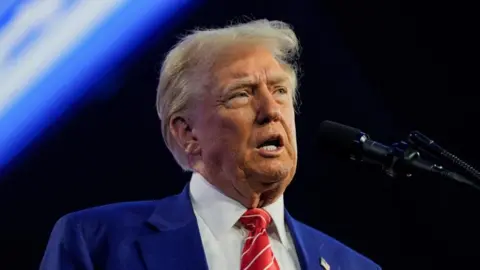Trump to be sentenced over hush money case but judge signals no jail time
 Reuters
ReutersA judge has ordered that Donald Trump will be sentenced on 10 January in his hush-money case in New York - less than two weeks before he is set to be sworn in as president.
New York Justice Juan Merchan signalled he would not sentence Trump to jail time, probation or a fine, but instead give him an "unconditional discharge", and wrote in his order that the president-elect could appear in person or virtually for the hearing.
Trump had attempted to use his presidential election victory to have the case against him dismissed.
The president-elect has posted on social media dismissing the judge's order as an "illegitimate political attack" and calling the case "nothing but a rigged charade".
Trump was convicted in May of 34 felony counts of falsifying business records related to a $130,000 (£105,000) payment to adult-film star Stormy Daniels.
The charges related to attempts to cover up reimbursements to his ex-lawyer, Michael Cohen, who in the final days of the 2016 election campaign paid off the adult-film star to remain silent about an alleged sexual encounter with Trump.
The president-elect has denied all wrongdoing and pleaded not guilty, arguing the case was an attempt to harm his 2024 presidential campaign.
In the post on his Truth Social platform on Saturday Trump said the judge's sentencing order "goes against our Constitution and, if allowed to stand, would be the end of the Presidency as we know it".
Trump's spokesperson Steven Cheung earlier called the order part of a "witch hunt".
"President Trump must be allowed to continue the presidential transition process and to execute the vital duties of the presidency, unobstructed by the remains of this or any remnants of the witch hunts," Cheung said.
"There should be no sentencing, and President Trump will continue fighting against these hoaxes until they are all dead."
In his latest motion against the case, Trump had argued the case would hang over him during his presidency and impede his ability to govern.
Justice Merchan said he had been advised of several measures he could employ that could assuage Trump's concerns about being distracted by a criminal case while serving as president that fell short of the "extreme remedy" of overturning the jury's verdict.
His options included delaying the sentencing until Trump, 78, leaves the White House in 2029, or guaranteeing a sentence that would not involve prison time.
Trump had initially, and unsuccessfully, argued the case against him ran afoul of a Supreme Court ruling on presidential immunity.
In July, the country's top court ruled that presidents have broad immunity from criminal prosecution for "official actions" they take while in office.
However, last month Justice Merchan ruled Trump's hush money conviction was valid.
Trump is currently set to be the first convicted felon to serve in the White House.
He may attempt to appeal against the conviction after the sentencing.
While falsifying business records is punishable by up to four years in prison in the US, there is no minimum sentence and incarceration is not required.
Even before his election victory, legal experts thought it was unlikely Trump would face jail time given his age and his legal record.
Trump has also been charged in three other state and federal criminal cases: one involving classified documents and two relating to his alleged efforts to overturn his loss in the election of 2020.
The president-elect was initially scheduled to be sentenced on 26 November, but Justice Merchan pushed the date back after Trump won the presidential election.
